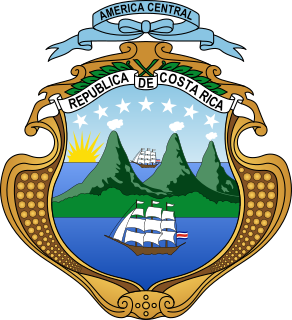
Costa Rica is an active member of the international community and, in 1983, claimed it was for neutrality. Due to certain powerful constituencies favoring its methods, it has a weight in world affairs far beyond its size. The country lobbied aggressively for the establishment of the Office of the United Nations High Commissioner for Human Rights and became the first nation to recognize the jurisdiction of the Inter-American Human Rights Court, based in San José.

Mark Andrew Green is an American politician and diplomat who is the president, director and CEO of the Woodrow Wilson International Center for Scholars. Before joining the Wilson Center on March 15, 2021, he served as the executive director of the McCain Institute for International Leadership, and prior to that, as the Administrator of the United States Agency for International Development. He served in the Wisconsin State Assembly from 1993 to 1999, was a Republican member of the United States House of Representatives from 1999 to 2007, representing Wisconsin's 8th congressional district, ran unsuccessfully for governor of Wisconsin in 2006, and held the post of United States Ambassador to Tanzania from August 2007 until January 2009. Green served as president of the International Republican Institute from 2014 to 2017 and sits on the board of directors of the Millennium Challenge Corporation.

The Millennium Challenge Corporation (MCC) is a bilateral United States foreign aid agency established by the U.S. Congress in 2004. It is an independent agency separate from the State Department and USAID. It provides grants to countries that have been determined to have good economic policies and potential for economic growth. The country qualification process is objective, involving scores provided by third parties in 20 different areas. An eligible country must apply for a grant with a specific project in mind.

Lorne Whitney Craner, was an American foreign policy expert, has served in key diplomatic and policymaking roles in three administrations and three times as President of major non-governmental organizations.
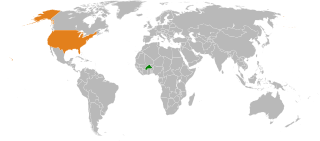
Relations between Burkina Faso and the United States are good but subject to strains in the past because of the Compaoré government's past involvement in arms trading and other sanctions-breaking activity.

Relations between Costa Rica and the United States have been historically close; nevertheless there were instances in history where the US and Costa Rica disagreed. One such example might be the case of Freebooter William Walker. Nevertheless, considering that Costa Rica generally supports the U.S. in international fora, especially in the areas of democracy and human rights, modern day relations are very strong.

Lesotho–United States relations are bilateral relations between the Kingdom of Lesotho and the United States of America.

According to the 2014 census, there are 37,241 Moldovan-Americans residing in the United States.
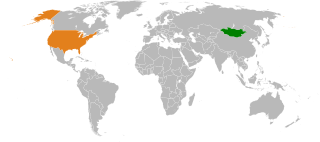
Mongolia–United States relations are bilateral relations between the United States and Mongolia.
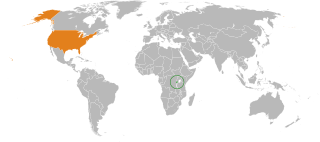
Rwanda–United States relations are bilateral relations between Rwanda and the United States.
Cassandra Quin Butts was an American lawyer, policy expert, and Deputy White House counsel. On December 23, 2008, Butts was selected by President-elect Barack Obama to serve as Deputy White House Counsel, focusing on domestic policy and ethics. She was on the advisory board for then-president-elect Barack Obama's presidential transition team.
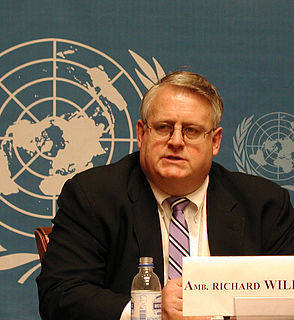
Richard Salisbury Williamson was an American lawyer, diplomat and political advisor. He previously served as Special Envoy to Sudan under George W. Bush. Williamson was a partner at Winston & Strawn and was also Thomas J. Sharkey Distinguished Visiting Scholar at Seton Hall's Whitehead School of Diplomacy.
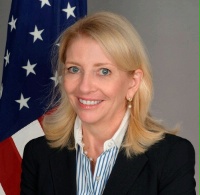
Catherine Mary Russell is an American attorney, political adviser, and director of the White House Presidential Personnel Office. She was the United States Ambassador-at-Large for Global Women's Issues from May 8, 2013, until January 20, 2017. Before that, she was chief of staff to the Second Lady of the United States, Jill Biden. On December 10, 2021, she was appointed the executive director of the UN Children's Fund (UNICEF). Russell took office as UNICEF head on February 1, 2022.

Donald Lu is a United States diplomat serving as Assistant Secretary of State for South and Central Asian Affairs since 2021. He previously served as both the United States Ambassador to Kyrgyzstan from 2018 to 2021 and the United States Ambassador to Albania from 2015 to 2018.

Daniel W. Yohannes is an Ethiopian-American businessman and philanthropist who served as the U.S. Ambassador to the OECD from 2014 to 2017.

Jane Dorothy Hartley is an American diplomat who has served as the United States ambassador to the United Kingdom in the Joe Biden administration since 2022. She served as the United States ambassador to France and Monaco from 2014 until 2017 during the Barack Obama administration. She is also a member of the Council on Foreign Relations.
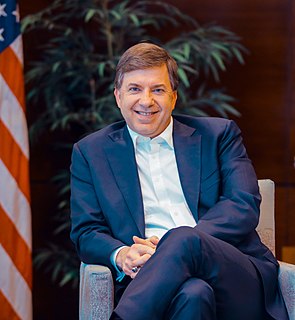
Todd Crawford Chapman is an American career diplomat who has served as the United States Ambassador to Brazil and the United States Ambassador to Ecuador.

Stafford Fitzgerald Haney is an American diplomat and businessman who served as the U.S. Ambassador to the Republic of Costa Rica from 2015 to 2017. Haney was nominated as U.S. Ambassador to Costa Rica by President Barack Obama on July 8, 2014, and was confirmed by the full Senate on May 23, 2015. He served until July 15, 2017, having been the only Obama-appointed political ambassador in the world allowed to stay under the Donald Trump administration.
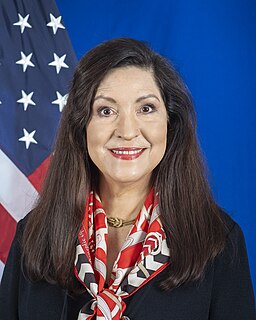
Cynthia Ann Telles is an American academic and psychologist who currently serves as the US Ambassador to Costa Rica. She is a clinical professor in the UCLA Department of Psychiatry at the David Geffen School of Medicine at UCLA and serves on the executive committee of the Semel Institute for Neuroscience and Human Behavior. She is the founding director of the Hispanic Neuropsychiatric Center of Excellence.

Alice Patterson Albright is an American government official who has served as the CEO of the Millennium Challenge Corporation since 2022.




















